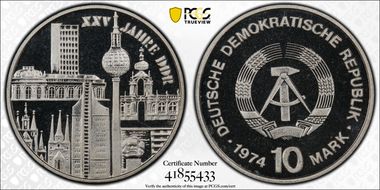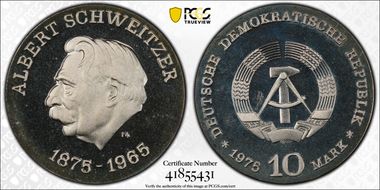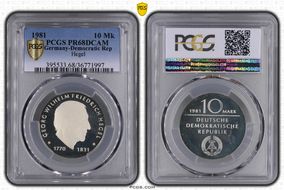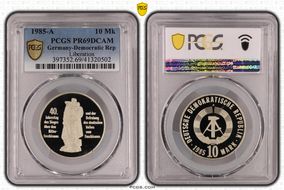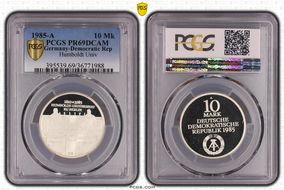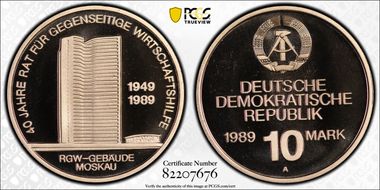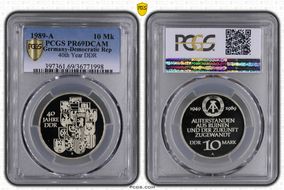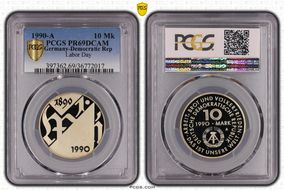Koenigsberg Collection | E. Germany 10 Mark PR | Commemoratives 的钱币相册
Germany-Democratic Republic | KM# 81 | J-1581 | Commemorating the 150th obit of Georg Wilhelm Friedrich Hegel Georg Wilhelm Friedrich Hegel (/ˈheɪɡəl/; German: [ˈɡeːɔʁk ˈvɪlhɛlm ˈfʁiːdʁɪç ˈheːɡl̩]; 27 August 1770 – 14 November 1831) was a German philosopher and the most important figure in German idealism. He is considered one of the fundamental figures of modern Western philosophy, with his influence extending to the entire range of contemporary philosophical issues, from aesthetics to ontology to politics, both in the analytic and continental tradition.
Germany-Democratic Republic | KM# 81 | J-1581 | Commemorating the 150th obit of Georg Wilhelm Friedrich Hegel Georg Wilhelm Friedrich Hegel (/ˈheɪɡəl/; German: [ˈɡeːɔʁk ˈvɪlhɛlm ˈfʁiːdʁɪç ˈheːɡl̩]; 27 August 1770 – 14 November 1831) was a German philosopher and the most important figure in German idealism. He is considered one of the fundamental figures of modern Western philosophy, with his influence extending to the entire range of contemporary philosophical issues, from aesthetics to ontology to politics, both in the analytic and continental tradition.
Germany-Democratic Republic | KM# 82 | J-1582 | Commemorating the 700th anniversary of the Berlin mint The Staatliche Münze Berlin (SMB) is a European coin mint located in the city of Berlin. It is one of the four German coin mints, the most prominent of the others being the SMBW which, on 1 January 2014 was authorised to mint coins for the Latvian government. All coins from the SMB contain an 'A' mark for tracking purposes. The SMB has been in operation since 1750 during the era of Frederick the Great.
Germany-Democratic Republic | KM# 107 | J-1606 | Commemorating the 175th anniversary of the Humboldt University of Berlin Humboldt University of Berlin (German: Humboldt-Universität zu Berlin, abbreviated HU Berlin) is a public research university in the central borough of Mitte in Berlin, Germany. It was established by Frederick William III on the initiative of Wilhelm von Humboldt, Johann Gottlieb Fichte and Friedrich Ernst Daniel Schleiermacher as the University of Berlin (Universität zu Berlin) in 1809, and opened in 1810, making it the oldest of Berlin's four universities. From 1810 until its closure in 1945, it was named Friedrich Wilhelm University (German: Friedrich-Wilhelms-Universität). During the Cold War the university found itself in East Berlin and was de facto split in two when the Free University of Berlin opened in West Berlin. The university received its current name in honour of Alexander and Wilhelm von Humboldt in 1949.
Germany-Democratic Republic | KM# 107 | J-1606 | Commemorating the 175th anniversary of the Humboldt University of Berlin Humboldt University of Berlin (German: Humboldt-Universität zu Berlin, abbreviated HU Berlin) is a public research university in the central borough of Mitte in Berlin, Germany. It was established by Frederick William III on the initiative of Wilhelm von Humboldt, Johann Gottlieb Fichte and Friedrich Ernst Daniel Schleiermacher as the University of Berlin (Universität zu Berlin) in 1809, and opened in 1810, making it the oldest of Berlin's four universities. From 1810 until its closure in 1945, it was named Friedrich Wilhelm University (German: Friedrich-Wilhelms-Universität). During the Cold War the university found itself in East Berlin and was de facto split in two when the Free University of Berlin opened in West Berlin. The university received its current name in honour of Alexander and Wilhelm von Humboldt in 1949.
Germany-Democratic Republic | KM# 126 | J-1625 | Commemorating the 40th anniversary of the Council for Mutual Economic Assistance The Council for Mutual Economic Assistance (Russian: Сове́т Экономи́ческой Взаимопо́мощи, tr. Sovét Ekonomícheskoy Vzaimopómoshchi, СЭВ; English abbreviation COMECON, CMEA, CEMA, or CAME) was an economic organization from 1949 to 1991 under the leadership of the Soviet Union that comprised the countries of the Eastern Bloc along with a number of socialist states elsewhere in the world. The descriptive term was often applied to all multilateral activities involving members of the organization, rather than being restricted to the direct functions of Comecon and its organs. This usage was sometimes extended as well to bilateral relations among members because in the system of communist international economic relations, multilateral accords – typically of a general nature – tended to be implemented through a set of more detailed, bilateral agreements. Comecon was set up initially to prevent countries in the Soviet sphere of influence from moving towards that of the United States. It was the Eastern Bloc's response to the formation in Western Europe of the Marshall Plan and the OEEC, which later became the OECD.
Germany-Democratic Republic | KM# 132 | J-1630 | Commemorating 40 years of GDR
Germany-Democratic Republic | KM# 132 | J-1630 | Commemorating 40 years of GDR
Germany-Democratic Republic | KM# 136 | J-1637 | Commemorating the 100th anniversary of the Labour Day Labour Day in Germany takes place on 1 May each year. As the name indicates, the day celebrates workers, their rights and their contributions to society and the economy.
Germany-Democratic Republic | KM# 136 | J-1637 | Commemorating the 100th anniversary of the Labour Day Labour Day in Germany takes place on 1 May each year. As the name indicates, the day celebrates workers, their rights and their contributions to society and the economy.




















